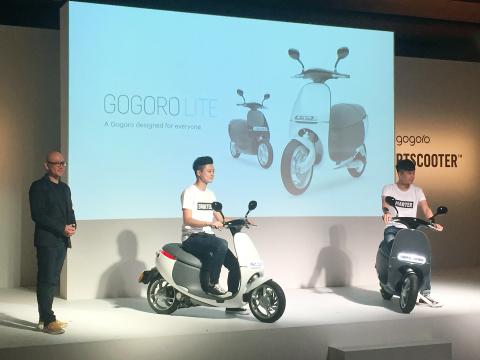Gogoro Inc (睿能創意) yesterday unveiled a cheaper model of its electric scooter and cut prices on other models by as much as 23.43 percent in a bid to boost sales and to expand its user base in Taiwan.
“I have received a lot of feedback from consumers. They said they love Gogoro, but the prices are too high. The new prices make them more affordable,” Gogoro cofounder and chief executive officer Horace Luke (陸學森) told a news conference in Taipei.
Under the Taiwanese start-up’s revised pricing scheme, its highest-end model, Gogoro Plus, is NT$108,000 per scooter, 21.73 percent less than the initial price of NT$138,000.

Photo: CNA
The standard version is NT$98,000 per scooter, 23.43 percent less than the original price of NT$128,000.
The newly unveiled Gogoro Lite scooter is NT$88,000, the company said.
“As consumers can apply for a subsidy of up to NT$26,000 from the government for electric scooters, they only need to spend NT$62,000 to get a Gogoro Lite,” Luke said.
For consumers who purchased a Gogoro scooter before the price cuts, the company is to refund the difference, Luke said.
Gogoro sold about 1,000 electric scooters since it started to ship the products in August.
Gogoro chief marketing officer Peng Ming-i (彭明義) said 84 percent of buyers were individual consumers and 16 percent were from enterprises.
“Lowering the prices could help us enlarge Gogoro’s consumer base in Taiwan,” Peng said, adding that the new prices appear more attractive.
When asked if the new prices would cover Gogoro’s manufacturing costs, Peng said the company could get cheaper prices from supply chains once it receives large orders from consumers.
“A significant amount of consumers could eventually help us reduce manufacturing costs,” he said.
In a bid to expand their local market, Peng said the company plans to move beyond Taipei and set up battery-swapping stations in Taoyuan, Hsinchu and Keelung before the end of the year.

NOT JUSTIFIED: The bank’s governor said there would only be a rate cut if inflation falls below 1.5% and economic conditions deteriorate, which have not been detected The central bank yesterday kept its key interest rates unchanged for a fifth consecutive quarter, aligning with market expectations, while slightly lowering its inflation outlook amid signs of cooling price pressures. The move came after the US Federal Reserve held rates steady overnight, despite pressure from US President Donald Trump to cut borrowing costs. Central bank board members unanimously voted to maintain the discount rate at 2 percent, the secured loan rate at 2.375 percent and the overnight lending rate at 4.25 percent. “We consider the policy decision appropriate, although it suggests tightening leaning after factoring in slackening inflation and stable GDP growth,”

DIVIDED VIEWS: Although the Fed agreed on holding rates steady, some officials see no rate cuts for this year, while 10 policymakers foresee two or more cuts There are a lot of unknowns about the outlook for the economy and interest rates, but US Federal Reserve Chair Jerome Powell signaled at least one thing seems certain: Higher prices are coming. Fed policymakers voted unanimously to hold interest rates steady at a range of 4.25 percent to 4.50 percent for a fourth straight meeting on Wednesday, as they await clarity on whether tariffs would leave a one-time or more lasting mark on inflation. Powell said it is still unclear how much of the bill would fall on the shoulders of consumers, but he expects to learn more about tariffs

Greek tourism student Katerina quit within a month of starting work at a five-star hotel in Halkidiki, one of the country’s top destinations, because she said conditions were so dire. Beyond the bad pay, the 22-year-old said that her working and living conditions were “miserable and unacceptable.” Millions holiday in Greece every year, but its vital tourism industry is finding it harder and harder to recruit Greeks to look after them. “I was asked to work in any department of the hotel where there was a need, from service to cleaning,” said Katerina, a tourism and marketing student, who would

i Gasoline and diesel prices at fuel stations are this week to rise NT$0.1 per liter, as tensions in the Middle East pushed crude oil prices higher last week, CPC Corp, Taiwan (台灣中油) and Formosa Petrochemical Corp (台塑石化) said yesterday. International crude oil prices last week rose for the third consecutive week due to an escalating conflict between Israel and Iran, as the market is concerned that the situation in the Middle East might affect crude oil supply, CPC and Formosa said in separate statements. Front-month Brent crude oil futures — the international oil benchmark — rose 3.75 percent to settle at US$77.01